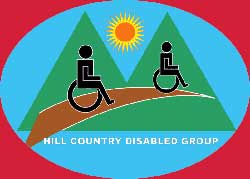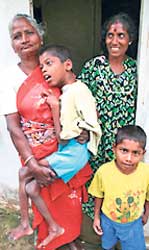
Living with disabilities in the hill countryNew initiatives to empower the handicapped. Home to picturesque tea gardens, magnificent waterfalls, and hard working people, the hill country seems like paradise to many. Yet the harsh reality is that life in the hill country is not easy. The same terrain that delights the eye also presents formidable obstacles to social and economic development. Public health, education, transportation, and employment opportunities are all limited by the rugged terrain.
When conditions in the hill country are this difficult even for able-bodied adults, then how much more difficult is it for persons living with disabilities? When most people traverse steep terrain daily to reach their school or market or workplace, then what about persons whose mobility is limited by one disability or another? To mention only a few difficulties that the handicapped face, in the hill country wheelchairs—when available—can be used only within or near one's residence, the handicapped and infirm who cannot walk must often be carried by relatives up and down steep slopes. People with disabilities remain unrepresented and live in conditions of severe poverty and isolation, without proper medical care, educational or livelihood opportunities, or interaction with the outside world. Often a disability makes it difficult to complete one’s education, making it still harder to find employment as an adult. About 90 percent of disabled people in Sri Lanka are unemployed. In the hill country, that percentage is even higher. In terms of health, it is not uncommon to find persons with disabilities who for the past five or even ten years have not seen a doctor. The terrain and difficulty of access to health facilities, combined with the poverty of most families, means that persons with disabilities seldom ever receive adequate medical treatment. Poverty and disability There is a two-way link between poverty and disability that creates a vicious circle. Poor people are at greater risk of acquiring a disability because of lack of access to good nutrition, health care, sanitation, as well as safe living and working conditions. Once this happens, people with disabilities face further barriers to the education, employment, and public services that can help them to escape poverty.
Accurate statistics are not available, but the incidence of disabilities appears to be substantially higher in the hill country for reasons that are not clearly understood. Excessive inbreeding within a gene pool over generations can cause recessive genetic traits to manifest as congenital disabilities. Overuse of chemical pesticides, and lack of treatment facilities for drinking water and sewage may also be contributing factors. The challenges confronting persons with disabilities in the hill country are such that it is difficult—if not impossible—for them to escape despair. But new initiatives by governmental and non-governmental agencies aim to dispel the veil of isolation of handicapped individuals and empower them to live fully productive lives. National policy The Government considers it vital that all differently abled persons be treated as respected citizens without any discrimination. The National Secretariat for Persons with Disabilities under the Ministry of Social Welfare conducts early intervention programmes for disabled children, develops vocational skills, and helps with job placement, among other services. Among other ways that the Government is working to uplift and empower the handicapped, policies and legislation are now in place that provide for:
Self-help Self-help groups for the differently abled are a recent social initiative. One of the most innovative and enterprising of these is the Hill Country Disability Group, a non-profit initiative based in Badulla District whose membership also includes ICTA Nanasala operators and other ICT-competent volunteers. Group members use Information & Communications Technology (ICT) to network with one other and with partner agencies and individuals abroad, and to empower families to help themselves. Their web site (www.HCDG.org) for instance, provides forms in Sinhala and Tamil for families to apply for Government-funded grants for the differently abled. The Hill Country Disability Group focuses upon livelihood projects for the disabled and their families. Examples of their livelihood schemes include:
One major benefit of the telecom scheme is that when several handicapped families are involved, a self sustaining telecom network of handicapped families is established that generates income to cover its cost of operation. Families can then easily network with one another by phone, promoting greater awareness among the disabled, lifting the veil of isolation, and promoting a sense of full citizenship in their community. Members’ social status is transformed from being community liabilities to being self employed telecom operators serving their isolated communities. Handicapped community self-help groups like the Hill Country Disability Group demonstrate that, given the same opportunities as others, disabled people can live richly satisfying lives as full partners in Sri Lanka’s social and economic development. |
|| Front
Page | News | Editorial | Columns | Sports | Plus | Financial
Times | International | Mirror | TV
Times | Funday
Times || |
| |
Reproduction of articles permitted when used without any alterations to contents and the source. |
© Copyright
2008 | Wijeya
Newspapers Ltd.Colombo. Sri Lanka. All Rights Reserved. |

